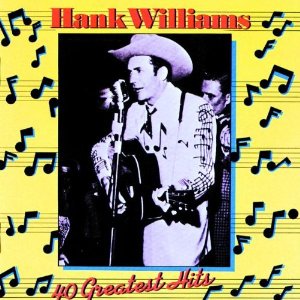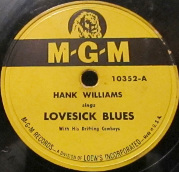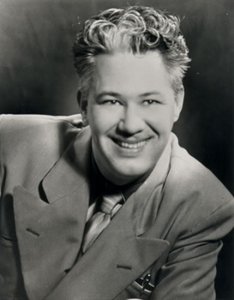
HiramKing "Hank" Williams was an American singer-songwriter. He is regarded as one of the most significant and influential American singers and songwriters of the 20th century. Williams recorded 55 singles that reached the top 10 of the Billboard Country & Western Best Sellers chart, five of which were released posthumously, and 12 of which reached No.1.
Knowles Fred Rose was an American musician, Hall of Fame songwriter, and music publishing executive.
This is a list of notable events in country music that took place in 1961.
"Cold, Cold Heart" is a country music and pop song written and first recorded by Hank Williams. This blues ballad is both a classic of honky-tonk and an entry in the Great American Songbook.

40 Greatest Hits is a two-record greatest hits compilation by American singer-songwriter Hank Williams. It was released in 1978 by Mercury Records – who under PolyGram became responsible for the MGM tape vault – on the 25th anniversary of Williams' death. Significantly, it was the first anthology in quite some time that did not subject Williams' recordings to either rechanneled stereo, posthumous overdubs, artificial duets with family members, or most or all of the above. Because of both this, and the value-for-money attraction of having a deeper song selection than single-disc compilations issued previously by MGM Records, many reviewers consider this anthology to be the perfect starting point for newcomers to Williams' recorded legacy. The album remains, to this day, the best-selling record of Williams' career.

"Lovesick Blues" is a Tin Pan Alley song, composed by Cliff Friend, with lyrics by Irving Mills. It first appeared in the 1922 musical "Oh, Ernest", and was recorded that year by Elsie Clark and Jack Shea. Emmett Miller recorded it in 1925 and 1928, followed by country music singer Rex Griffin in 1939. The recordings by Griffin and Miller inspired Hank Williams to perform the song during his first appearances on the Louisiana Hayride radio show in 1948. Receiving an enthusiastic reception from the audience, Williams decided to record his own version despite initial push back from his producer Fred Rose and his band.

"I Saw the Light" is a country gospel song written by Hank Williams. Williams was inspired to write the song while returning from a concert by a remark his mother made while they were arriving in Montgomery, Alabama. He recorded the song during his first session for MGM Records, and released in September 1948. Williams' version did not enjoy major success during its initial release, but eventually it became one of his most popular songs and the closing number for his live shows. It was soon covered by other acts, and has become a country gospel standard.

"Kaw-Liga" is a country music song written by Hank Williams and Fred Rose.

Audrey Mae Sheppard Williams was an American musician known for being the first wife of country music singer and songwriter Hank Williams, the mother of Hank Williams Jr., and the grandmother of Hank Williams III and Holly Williams.

Theron Eugene "Ted" Daffan was an American country musician noted for composing the seminal "Truck Driver's Blues" and two much covered country anthems of unrequited love, "Born to Lose" and "I'm a Fool to Care".
"Take These Chains from My Heart" is a song by Hank Williams. It was written by Fred Rose and Hy Heath and was recorded at Williams' final recording session on September 23, 1952, in Nashville. The song has been widely praised; Williams' biographer Colin Escott deems it "perhaps the best song [Rose] ever presented to Hank...It was one of the very few songs that sounded somewhat similar to a Hank Williams song." Williams is backed by Tommy Jackson (fiddle), Don Helms, Chet Atkins, Jack Shook, and Floyd "Lightnin'" Chance (bass). In the wake of Williams' death on New Year's Day, 1953, the song shot to No. 1, his final chart-topping hit for MGM Records. Like "Your Cheatin' Heart," the song's theme of despair, so vividly articulated by Williams' typically impassioned singing, reinforced the image of Hank as a tortured, mythic figure.
"Honky Tonkin'" is a 1947 country music song, written and recorded by Hank Williams. His song went to #14 on the Billboard country music chart in 1948. In 1982, it became the sixth chart topping single for Williams' son, Hank Williams Jr.

"I'm a Long Gone Daddy" is a country song written and recorded by Hank Williams. It was released in 1948 on MGM Records and became his second top ten hit.

"I Can't Help It (If I'm Still in Love with You)" is a song written and originally recorded by Hank Williams on MGM Records. It hit number two on the Billboard country singles chart in 1951. In his autobiography, George Jones printed the first six lines of the song and stated, "Its lyrics couldn't be more simple - or profound."
"A Mansion on the Hill" is a song written by Hank Williams and Fred Rose and originally recorded by Williams on MGM Records. It peaked at No. 12 on the Most Played Jukebox Folk Records chart in March 1949.
There'll Be No Teardrops Tonight is a song written by Hank Williams and released on MGM Records as the B-side to "Mind Your Own Business" in July 1949.
Six More Miles (To the Graveyard) is a song written by Hank Williams for MGM Records. It appeared as the B-side to "I Saw the Light" in 1948.

Memorial Album is the first Hank Williams LP issued by MGM Records after the singer's death on New Year's Day 1953.
"Blue Love (In My Heart)" is a song written by Fred Rose (credited under the pseudonym "Floyd Jenkins") and recorded by Hank Williams. It was released as a posthumous single by MGM Records in 1956. Williams recorded the song while living in Shreveport working the Louisiana Hayride in 1948 and 1949. It was one of his several Rose compositions he performed on the Johnny Fair Syrup radio show on KWKH in Shreveport. Rose produced Hank's records and published his songs through his company Acuff-Rose.
"Rockin' Chair Daddy" is a honky tonk country song written and recorded by Braxton Shuffert. Hank Williams was the co-writer.









